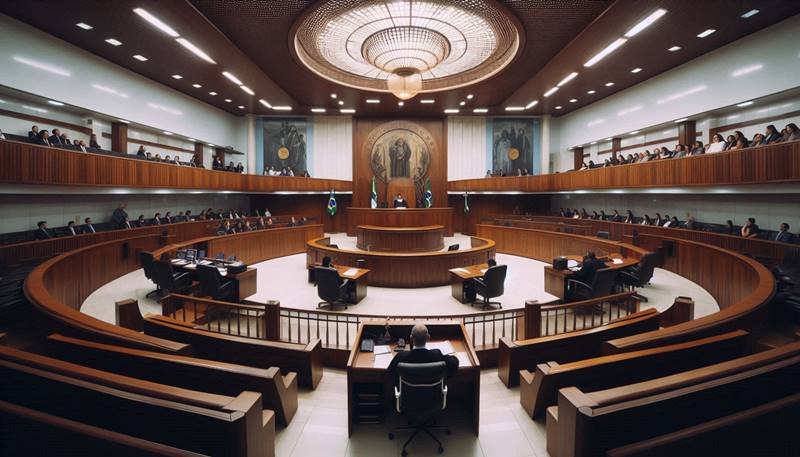
Brazil has had intense discussions about immigration in recent years, especially in light of the country’s migratory trends toward the United States, Portugal, and Japan. It is a difficult process that is very important for both people looking for new opportunities overseas and governments controlling foreigners’ entry and stay, as they always want to safeguard national security and interests.
This discussion will briefly explore the context of the U.S. immigration system, focusing on the foundational principle of good faith.
As stated in Article 4 of the Brazilian Law of Introduction to Norms of Brazilian Law (LINDB), our legislator recognizes principles as a supplementary source of law in our legal system, as Silvio Venosa has emphasized. Principles are embedded in our basic norms of coexistence; they are essential in society and manifest in the consensus of global legal culture, deriving from reason and giving rise to positive law itself.
This principle serves as a source of law in all known legal systems and is particularly crucial in the immigration process. It plays a vital role in the evaluation of eligibility and the approval of visa applications, residency, and other forms of immigration status.
The U.S. immigration procedure is primarily document-based and often hinges on objective criteria fulfilled by the submission of these documents. Immigration analysts and officials are tasked with placing complete trust in the authenticity of documents produced in other countries, possibly in different languages and under laws that they might not fully understand. This trust is founded on the principle of good faith, which accepts the statements or information provided as true.
It is not hard to believe that a disregard for this principle, manifested through misrepresentations or false statements, can lead not only to the denial of a specific application but also to detrimental consequences for future applicants, undermining the integrity of the system as a whole.
The Role of Good Faith in Immigration Law
The principle of good faith is widely recognized and applied across various areas of law, including immigration law. It presupposes that the parties involved in a legal process will act with honesty, transparency, and loyalty.
In immigration matters, good faith is essential for building mutual trust between the applicant and immigration authorities, who rely on the information provided to make fair and accurate decisions.
Consequences of Violating Good Faith
While the term “good faith” is not frequently used explicitly in immigration legislation, the concept underlies many aspects of the process. For instance, in marriage-based visa cases, the Immigration and Nationality Act (INA) requires that the marriage be genuine and not a fraudulent arrangement for immigration purposes. Section 204(c) of the INA prohibits the approval of an immigration application if USCIS determines that the marriage was entered into with the intent to evade immigration laws, reflecting an implicit expectation of good faith.
In the United States, the U.S. Citizenship and Immigration Services (USCIS) is responsible for reviewing petitions and determining whether candidates meet the legal requirements for the benefits sought. In this context, the honesty of the applicant in providing information is crucial. Submitting false documents, omitting relevant facts, or deliberately distorting the truth can be interpreted as acting in bad faith, leading to the rejection of the application and, in many cases, to the permanent inadmissibility of the applicant.
A notable case involving a Brazilian national illustrates the severe consequences of violating the principle of good faith in immigration processes. In a decision by the Administrative Appeals Office (AAO) dated April 14, 2023, the petitioner, a construction entrepreneur, initially had his National Interest Waiver (NIW) request approved, but it was later revoked after discovering material misrepresentations in the information provided during the process. The false claims regarding the nature of his work and professional experience cast doubt on his eligibility, ultimately leading to the revocation of the petition.
This decision exemplifies how a violation of the principle of good faith can compromise not only the individual application, but also negatively influence the perception and trust of immigration authorities in future cases. Each detected case of fraud or bad faith increases scrutiny and the rigor of subsequent evaluations, making the process more challenging for other legitimate applicants. Thus, the misconduct of one individual can have far-reaching repercussions, impacting the collective group of candidates seeking to immigrate to the United States.
Implications for Future Applicants
The presence of bad faith, manifested through misrepresentations or false statements, affects not only the specific petitioner involved but also significantly impacts future applicants. As immigration authorities become more cautious and stringent in their evaluations due to previous cases of fraud, candidates who genuinely meet legal requirements may face additional barriers and heightened evidence demands to substantiate their claims.
These increased difficulties can manifest in various ways, such as the need to provide additional documentation, undergoing more detailed interviews, and intensifying background checks. Furthermore, the trust of authorities in certain visa categories or nationalities may be shaken, resulting in more rigorous scrutiny for all applicants from those categories or countries.
Conclusion
The principle of good faith is a fundamental cornerstone in immigration law, particularly within the U.S. system, where honesty and transparency from applicants are essential for the fair and efficient operation of the immigration process.
Misrepresenting the truth or submitting false claims not only jeopardizes the approval of a specific application but also harms the system as a whole, increasing distrust and difficulties for future applicants. Therefore, it is imperative for all candidates to understand the importance of acting with integrity and truthfulness when seeking immigration benefits, lest they face serious and lasting consequences.


